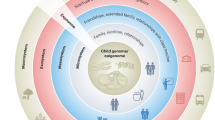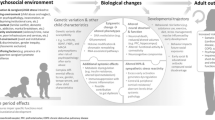Abstract
Objectives
To explore current evidence of the physiological embedding of stress to discuss whether adverse childhood experiences (ACE) causing chronic or acute stress responses may alter fundamental biological functions.
Methods
A non-systematic review of the literature was carried out using keyword searches in Pubmed and the web of science from May to October 2011. In reference to the literature identified, we examine the potential biological pathways potentially linking exposure to ACE and cancer development and progression in adulthood.
Results
These mechanisms, in interaction with social position, and mediated by subsequent environmental exposures, may ultimately lead to the development of cancer. The experience of acute or chronic stressors during sensitive periods of childhood development which can induce several known biological responses, are likely to have an impact on subsequent biological and behavioural functions depending on the timing of initial exposures, and subsequently mediated by later exposures. For this reason, childhood exposure to adversity is a likely source of both acute and chronic stressors, and can be examined as an important initial exposure on a pathway towards adult ill health.
Conclusions
Such pathways justify a life course approach to understanding cancer aetiology, which may have its origins early in life.

Similar content being viewed by others
References
Adler NE, Stewart J (2010) Preface to the biology of disadvantage: socioeconomic status and health. Ann NY Acad Sci 1186:1–4
Anda RF et al (1999) Adverse childhood experiences and smoking during adolescence and adulthood. JAMA 282(17):1652–1658
Anda RF et al (2006) The enduring effects of abuse and related adverse experiences in childhood. A convergence of evidence from neurobiology and epidemiology. Eur Arch Psychiatry Clin Neurosci 256(3):174–186
Anda RF et al (2002) Adverse childhood experiences, alcoholic parents, and later risk of alcoholism and depression. Psychiatr Serv 53(8):1001–1009
Anderson V et al (2009) Childhood brain insult: can age at insult help us predict outcome? Brain 132(Pt 1):45–56. doi:10.1093/brain/awn293
Antoni MH et al (2006a) The influence of bio-behavioural factors on tumour biology: pathways and mechanisms. Nat Rev Cancer 6(3):240–248. doi:10.1038/nrc1820
Antoni MH et al (2006b) Opinion—the influence of bio-behavioural factors on tumour biology: pathways and mechanisms. Nat Rev Cancer 6(3):240–248. doi:10.1038/nrc1820
Bailey DBJ, Bruer JT, Symons FJ, Lichtman JW (eds) (2001) Critical thinking about critical periods. Paul H. Brookes Publishing Co., Baltimore
Bale TL (2006) Stress sensitivity and the development of affective disorders. Horm Behav 50(4):529–533. doi:10.1016/j.yhbeh.2006.06.033
Bale TL et al (2010) Early life programming and neurodevelopmental disorders. Biol Psychiatry 68(4):314–319. doi:10.1016/j.biopsych.2010.05.028
Barker DJP, Osmond C (1986) Infant mortality, childhood nutrition, and ischaemic heart disease in England and Wales. Lancet 1:1077–1081
Bergelt C, Prescott E, Gronbaek M, Koch U, Johansen C (2006) Stressful life events and cancer risk. Br J Cancer 95(11):1579–1581. doi:10.1038/sj.bjc.6603471
Borghol N et al (2011) Associations with early-life socio-economic position in adult DNA methylation. Int J Epidemiol. doi:10.1093/ije/dyr147
Brown DW et al (2010) Adverse childhood experiences are associated with the risk of lung cancer: a prospective cohort study. BMC Public Health 10:20. doi:10.1186/1471-2458-10-20
Bruer JT (2001) A critical and sensitive period primer. In: Bailey DB Jr, Bruer JT, Symons FJ, Lichtman JW (eds) Critical thinking about critical periods. Paul H. Brookes, Baltimore, p 299
Brunner E, Marmot M (2001) Social organization, stress, and health. In: Marmot M, Wilkinson RG (eds) Social determinants of health. Oxford University Press, Oxford, pp 17–43
Chung EK, Nurmohamed L, Mathew L, Elo IT, Coyne JC, Culhane JF (2010) risky health behaviors among mothers-to-be: the impact of adverse childhood experiences. Acad Pediatr 10(4):245–251
Clark C, Caldwell T, Power C, Stansfeld SA (2010) Does the influence of childhood adversity on psychopathology persist across the lifecourse? A 45-year prospective epidemiologic study. Ann Epidemiol 20(5):385–394. doi:10.1016/j.annepidem.2010.02.008
Danese A et al (2009) Adverse childhood experiences and adult risk factors for age-related disease depression, inflammation, and clustering of metabolic risk markers. Arch Pediatr Adolesc Med 163(12):1135–1143
Daw NW (1997) Critical periods and strabismus: what questions remain? Optom Vis Sci 74(9):690–694
Delpierre C, Kelly-Irving M (2011) To what extent are biological pathways useful when aiming to reduce social inequalities in cancer? Eur J Public Health 21(4):398–399. doi:10.1093/eurpub/ckr076
Dong M et al (2004) Insights into causal pathways for ischemic heart disease: adverse childhood experiences study. Circulation 110(13):1761–1766
Dube SR, Cook ML, Edwards VJ (2010) Health-related outcomes of adverse childhood experiences in Texas, 2002. Prev Chronic Dis 7(3):A52
Dube SR, Felitti VJ, Dong M, Chapman DP, Giles WH, Anda RF (2003a) Childhood abuse, neglect, and household dysfunction and the risk of illicit drug use: the adverse childhood experiences study. Pediatrics 111(3):564–572
Dube SR, Felitti VJ, Dong M, Giles WH, Anda EF (2003b) The impact of adverse childhood experiences on health problems: evidence from four birth cohorts dating back to. Prev Med 37(3):268–277
Duijts SFA, Zeegers MPA, Van der Borne B (2003) The association between stressful life events and breast cancer risk: a meta-analysis. Int J Cancer 107(6):1023–1029. doi:10.1002/ijc.11504
Eden A, Gaudet F, Waghmare A, Jaenisch R (2010) Chromosomal instability and tumors promoted by DNA hypomethylation. Science 300(5618):455. doi:10.1126/science.1083557
Feinberg AP (2004) The epigenetics of cancer etiology. Semin Cancer Biol 14(6):427–432. doi:10.1016/j.semcancer.2004.06.005
Feinberg AP (2007) Phenotypic plasticity and the epigenetics of human disease. Nature 447(7143):433–440. doi:10.1038/nature05919
Feinberg AP, Tycko B (2004) The history of cancer epigenetics. Nat Rev Cancer 4(2):143–153. doi:10.1038/nrc1279nrc1279
Felitti VJ et al (1998) Relationship of childhood abuse and household dysfunction to many of the leading causes of death in adults. The Adverse Childhood Experiences (ACE) Study. Am J Prev Med 14(4):245–258
Fox SE, Levitt P, Nelson CA (2010) How the timing and quality of early experiences influence the development of brain architecture. Child Dev 81(1):28–40
Fuller-Thomson E, Brennenstuhl S (2009) Making a link between childhood physical abuse and cancer results from a regional representative survey. Cancer 115(14):3341–3350. doi:10.1002/cncr.24372
Gidron Y, Ronson A (2008) Psychosocial factors, biological mediators, and cancer prognosis: a new look at an old story. Curr Opin Oncol 20(4):386–392
Gluckman PD, Low FM, Buklijas T, Hanson MA, Beedle AS (2011) How evolutionary principles improve the understanding of human health and disease. Evol Appl 4(2):249–263. doi:10.1111/j.1752-4571.2010.00164.x
Hochberg Z et al (2011) Child health, developmental plasticity, and epigenetic programming. Endocr Rev 32(2):159–224. doi:10.1210/er.2009-0039
Jirtle RL, Skinner MK (2007) Environmental epigenomics and disease susceptibility. Nat Rev Genet 8(4):253–262. doi:10.1038/nrg2045
Jones PA, Baylin SB (2002) The fundamental role of epigenetic events in cancer. Nat Rev Genet 3(6):415–428
Kelly Y, Sacker A, Del Bono E, Francesconi M, Marmot M (2011) What role for the home learning environment and parenting in reducing the socioeconomic gradient in child development? Findings from the Millennium Cohort Study. Arch Dis Child 96(9):832–877. doi:10.1136/adc.2010.195917
Kiecolt-Glaser JK, Glaser R (1999) Psychoneuroimmunology and cancer: fact or fiction? Eur J Cancer 35(11):1603–1607
Korpimaki SK, Sumanen MPT, Sillanmaki LH, Mattila KJ (2010) Cancer in working-age is not associated with childhood adversities. Acta Oncol 49(4):436–440. doi:10.3109/02841860903521103
Laird PW et al (1995) Suppression of intestinal neoplasia by DNA hypomethylation. Cell 81(2):197–205. doi:10.1016/0092-8674(95)90329-1
Lutgendorf SK, Sood AK, Antoni MH (2010) Host factors and cancer progression: biobehavioral signaling pathways and interventions. J Clin Oncol 28(26):4094–4099. doi:10.1200/jco.2009.26.9357
Matthews KA, Gallo LC, Taylor SE (2010) Are psychosocial factors mediators of socioeconomic status and health connections? A progress report and blueprint for the future biology. Ann NY Acad Sci 1186:146–173
Mayes LC, Swain JE, Leckman JF (2005) Parental attachment systems: neural circuits, genes, and experiential contributions to parental engagement. Clin Neurosci Res 4(5–6):301–313. doi:10.1016/j.cnr.2005.03.009
McCall RB, Plemons BW (2001) The concept of critical periods and their implications for early childhood services. In: Bailey DB Jr, Bruer JT, Symons FJ, Lichtman JW (eds) Critical thinking about critical periods. Paul H. Brookes, Baltimore, p 299
McGowan PO et al (2009) Epigenetic regulation of the glucocorticoid receptor in human brain associates with childhood abuse. Nat Neurosci 12(3):342–348. doi:10.1038/nn.2270
McGowan PO, Szyf M (2010) The epigenetics of social adversity in early life: implications for mental health outcomes. Neurobiol Dis 39(1):66–72. doi:10.1016/j.nbd.2009.12.026
Meaney MJ et al (1994) Early environmental programming hypothalamic–pituitary–adrenal responses to stress. Semin Neurosci 6(4):247–259. doi:10.1006/smns.1994.1032
Metcalfe C, Smith GD, Macleod J, Hart C (2007) The role of self-reported stress in the development of breast cancer and prostate cancer: a prospective cohort study of employed males and females with 30 years of follow-up. Eur J Cancer 43(6):1060–1065. doi:10.1016/j.ejca.2007.01.027
Nielsen NR, Zhang ZF, Kristensen TS, Netterstrom B, Schnohr P, Gronbaek M (2005) Self reported stress and risk of breast cancer: prospective cohort study. BMJ 331(7516):548–550. doi:10.1136/bmj.38547.638183.06
Nise MS, Falaturi P, Erren TC (2010) Epigenetics: origins and implications for cancer epidemiology. Med Hypotheses 74(2):377–382. doi:10.1016/j.mehy.2009.09.008
Ollonen P, Lehtonen J, Eskelinen M (2005) Stressful and adverse life experiences in patients with breast symptoms; a prospective case–control study in Kuopio, Finland. Anticancer Res 25(1B):531–536
Potischman N, Troisi R, Vatten LJ (2004) A life course approach to cancer epidemiology. In: Kuh D, Ben-Shlomo Y (eds) A life course approach to chronic disease epidemiology, 2nd edn. Oxford University Press, Oxford
Rosenman S, Rodgers B (2004) Childhood adversity in an Australian population. Soc Psychiatry Psychiatr Epidemiol 39(9):695–702. doi:10.1007/s00127-004-0802-0
Schraub S, Sancho-Garnier H, Velten M (2009) Should psychological events be considered cancer risk factors? Rev Epidemiol Sante Publique 57(2):113–123. doi:10.1016/respe.2008.12.012
Seeman T, Epel E, Gruenewald T, Karlamangla A, McEwen BS (2010) Socio-economic differentials in peripheral biology: cumulative allostatic load. Ann NY Acad Sci 1186:223–239
Sweeting H, West P (1995) Family life and health in adolescence: a role for culture in the health inequalities debate. Soc Sci Med 40(2):163–175. doi:10.1016/0277-9536(94)e0051-s
Szyf M (2009) The early life environment and the epigenome. Biochim Biophys Acta 1790(9):878–885. doi:10.1016/j.bbagen.2009.01.009
Thaker PH et al (2006) Chronic stress promotes tumor growth and angiogenesis in a mouse model of ovarian carcinoma. Nat Med 12(8):939–944. doi:10.1038/nm1447
Thomas C, Hypponen E, Power C (2008) Obesity and type 2 diabetes risk in midadult life: the role of childhood adversity. Pediatrics 121(5):E1240–E1249. doi:10.1542/peds.2007-2403
Tremblay RE (2010) Developmental origins of disruptive behaviour problems: the ‘original sin’ hypothesis, epigenetics and their consequences for prevention. J Child Psychol Psychiatry 51(4):341–367. doi:10.1111/j.1469-7610.2010.02211.x
Weaver ICG et al (2004) Epigenetic programming by maternal behavior. Nat Neurosci 7(8):847–854. doi:10.1038/nn1276
Wilkinson RG (1999) Health, hierarchy, and social anxiety. In: Adler NE, Marmot M, McEwen B, Stewart J (eds) Socioeconomic status and health in industrial nations—social, psychological, and biological pathways. Ann NY Acad Sci 896:48–63
Wong CC, Mill J, Fernandes C (2011) Drugs and addiction: an introduction to epigenetics. Addiction 106(3):480–489. doi:10.1111/j.1360-0443.2010.03321.x
Yamada Y et al (2005) Opposing effects of DNA hypomethylation on intestinal and liver carcinogenesis. Proc Natl Acad Sci USA 102(38):13580–13585. doi:10.1073/pnas.0506612102
Acknowledgments
This work was funded by a grant from the Institut National du Cancer and MKI is funded by the Ligue contre le cancer.
Author information
Authors and Affiliations
Corresponding author
Additional information
This article is part of the special issue "Life course influences on health and health inequalities: moving towards a Public Health perspective”.
Rights and permissions
About this article
Cite this article
Kelly-Irving, M., Mabile, L., Grosclaude, P. et al. The embodiment of adverse childhood experiences and cancer development: potential biological mechanisms and pathways across the life course. Int J Public Health 58, 3–11 (2013). https://doi.org/10.1007/s00038-012-0370-0
Received:
Revised:
Accepted:
Published:
Issue Date:
DOI: https://doi.org/10.1007/s00038-012-0370-0




